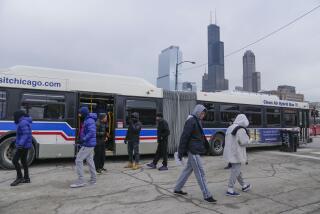MTA, Bus Activists Hold Rare Meeting With U.S. Mediator
- Share via
Representatives of the Metropolitan Transportation Authority and members of an advocacy group whose lawsuit brought about a bitterly contested federal consent decree to boost bus service held face-to-face talks Thursday with a federal mediator, the first such meeting in two years and the first since the agency’s legal appeals were quashed by the Supreme Court.
The meeting, at the U.S. District Courthouse in downtown Los Angeles, was important because the two sides rarely come together to address mediator Donald T. Bliss, the Washington attorney overseeing the 5-year-old agreement with judge-like power.
Bliss could force the MTA, which is responsible for finding solutions to the nation’s worst traffic, to spend hundreds of millions of dollars more than budgeted over the next decade on buses. Such a move could damage the MTA’s greatest hopes, including expansion of its light-rail network.
The two sides remain engaged in a legal street fight, agreeing on virtually nothing. As has been the case since the 10-year-long agreement was signed, the broadest point of contention Thursday was figuring out what constitutes bus overcrowding. The decree binds the MTA to benchmarks requiring it by June 30 to have an average of eight standees on its buses.
Given its first chance to address Bliss in a joint meeting in two years, MTA officials immediately painted themselves as having fulfilled their mission. “Under any reasonable interpretation the standard has been met,” said James Schreier, a lawyer hired by the MTA.
The MTA made the same case unsuccessfully to the federal courts before it was finally turned away in March by the Supreme Court, which refused to review the consent decree.
The Bus Riders Union, in response, characterized the MTA’s bus system as vastly overcrowded and “massively out of compliance” with the consent decree’s benchmarks, said representative Ted Robertson.
Because the meeting was exploratory, Bliss offered no solutions. He did have positive words for much of what he has seen from the MTA, acknowledging that the agency’s fleet of about 2,100 buses has vastly improved. Bliss will gather more information and come up with a short-term solution, potentially ordering scores more buses, within the next few months.
More to Read
Sign up for Essential California
The most important California stories and recommendations in your inbox every morning.
You may occasionally receive promotional content from the Los Angeles Times.














